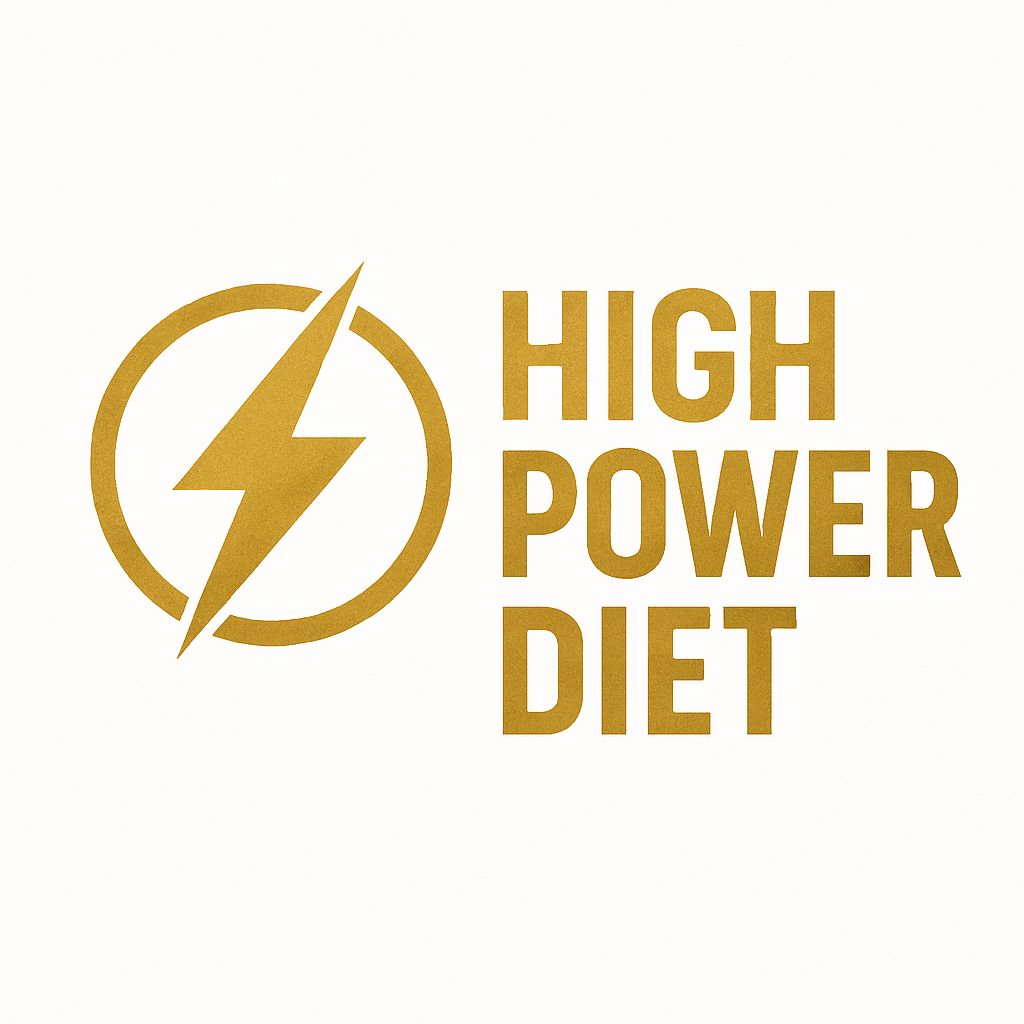Introducing the HIGH POWER DIET™
A diet designed like a system — because you are one.

The High Power Diet™ is more than just a diet — it’s a systems engineering approach to nutrition, and systems engineering is about aligning inputs with intended outcomes. Designed using systems thinking and powered by cutting-edge science and DNA-based insights, it draws from the best of proven strategies — keto, paleo, carb cycling, and more — to build a personalized, adaptive plan tailored to your unique biology. The High Power Diet™ is not just nutrition, but a precision framework that unites food, mindset, and purpose into a systems-engineered path so you can so you can work toward lasting results. It engages the body, sharpens the mind, and uplifts the spirit — aligning food, mindset, and purpose into one powerful framework. This is not a trend. It’s a precision-engineered path to strength, clarity, and resilience.

This diet isn’t just another trend — it’s a precision-crafted system designed to go beyond traditional diets by integrating the best of proven strategies into one adaptive framework. Developed by XSE Self Sculpt™, a Life & Fitness Coaching practice, this innovative nutrition framework is rooted in the principles of systems engineering — a discipline proven for over a century in optimizing the most complex technologies on Earth. The High Power Diet applies this same logic to the human system.
Unlike conventional diets that focus only on food, the High Power Diet recognizes that real transformation demands whole-system alignment — not just of the body, but also of the mind and inner drive. The framework treats food as a key input, but also engages the mind: building knowledge, fostering empowered choices, and aligning those choices with personal goals. It cultivates clarity, intention, and self-mastery through mindset and reflection. Just as importantly, it fosters positive attitudes and intentional support systems, acknowledging the human need for encouragement and inspiration.
This is a diet engineered for strength of body, clarity of mind, and resilience of spirit. By intelligently drawing from proven dietary frameworks like keto, paleo, carb cycling, and intermittent fasting, the High Power Diet activates the right strategy at the right time. It’s a dynamic, adaptive system — not a rigid rulebook. Whether you’re training, recovering, focusing, or leveling up, this diet delivers power without crash, progress without rigidity, and transformation with full-spectrum integrity.
A Systems Engineering Approach to Diet
When mind and spirit lead, the body follows.

The High Power Diet™ is not just a diet — it’s a mindset, an attitude, and an integrated approach to food. Developed by XSE Self Sculpt™, a Life & DNA-based Fitness Coaching practice, the High Power Training Triangle provides a strong, adaptable framework that empowers your mind, body, and spirit, helping you move toward your highest potential.
Mind: Begin by learning the principles of the High Power Diet™—starting with the insights on this page. When you understand what to expect, you’re better prepared to plan, respond, and thrive along the way. After all, knowledge is power.
Spirit: Before starting, take time to clarify your purpose. Is it to enjoy greater vitality, a stronger body, a brighter mood, or a deeper sense of freedom and hope? When your goals are rooted in meaning—whether personal growth, serving others, or honoring your faith—they fuel your journey. Surround yourself with influences that uplift and align with these intentions, and let go of those that don’t.
Body: The High Power Diet™ supports energy and resilience — but it’s when mind and spirit are integrated and engaged that true transformation happens. The High Power Diet™ isn’t just a program—it’s a path to vitality, strength, and a more fulfilling life.
System Overview
The High Power Diet™ is a nutrition framework inspired by systems engineering principles.
Purpose: To support the integration of mind, body, and spirit in a unified, resilient human person.
Goal: To build strength, integrity, and growth in the individual — supporting physical performance, sharpening mental clarity, and fostering the conditions for spiritual focus and balance.
Philosophy: Food is not only fuel — it is an intentional input that influences capacity, coherence, and strength, and should support the integration of mind, body, and spirit for greater resilience aligned with a deeper sense of purpose in life.
Guiding Principle
“The human is not a machine, but a dynamic system capable of strength, integrity, and advancement.”


System Inputs (Nutritional Domains)
The High Power Diet™ organizes nutrients as inputs to the subsystems of the human being.
Macronutrient Inputs (Body Subsystem)
Protein: Supports muscle repair, enzymatic function, and tissue integrity
Carbohydrates: Provide fast energy, replenish glycogen stores, and fuel the nervous system
Fats: Maintain hormonal balance, provide long-term energy, and support cell membrane integrity
Micronutrient Inputs (Mind Subsystem)
Minerals (Mg, Zn, Fe): Support neurotransmission, oxygen transport, and energy regulation
Vitamins (B-complex, D, K2): Promote cognitive clarity, resilience, and immune support
Electrolytes (Na, K, Cl): Regulate fluid balance, nerve signaling, and muscular coordination
Energy boosting Inputs (Spirit-Supporting Domain)
Hydration: Sustains clarity and vitality, creating conditions for focus, prayer, and reflection
Phytochemicals (herbs, spices, teas): Provide nourishment and symbolic support for rituals of mindfulness, gratitude, and intention
Rhythmic cycles: Aligning meals with natural rhythms (sunrise, rest, fasting, reflection) reinforces both bodily vitality and spiritual practice
System Outputs (Performance Outcomes)
Body: Supports strength development, lean mass preservation, joint and tendon resilience, and metabolic stability
Mind: Enhances focus, regulates stress response, promotes emotional steadiness, and strengthens adaptive cognition
Spirit: Fosters coherence and alignment, motivation rooted in purpose, and renewal through rest, reflection, and intentional practice
System Performance Metrics
Body: Strength benchmarks (e.g., PRs), lean mass trends, recovery timeframes
Mind: Hours of sustained focus, self-reported cognitive clarity, mood stability tracking
Spirit: Consistency between values and daily choices, resilience under stress, integrity in action
System Constraints
Integrity Constraint: Nutritional patterns should support human health and adaptive capacity, minimizing reliance on ultra-processed or inflammatory inputs.
Adaptation Constraint: Nutrient intake must be periodized to life phase (bulking, cutting, training, fasting, restoration) to sustain resilience and renewal.
Balance Constraint: Inputs to mind, body, and spirit should remain integrated and proportionate — neglecting one dimension destabilizes the system as a whole.


System Architecture
The High Power Diet™ models human performance through three integrated subsystems:
Subsystem A: Body (Physical Power)
Fuel = carbohydrates + fats
Structure = protein
Timing = prioritize post-training nutrition to replenish glycogen and support hormonal balance
Engineering principle = Preserve muscle, optimize glycogen, balance hormones
Subsystem B: Mind (Cognitive Power)
Fuel = steady glucose + micronutrient sufficiency
Structure = neurotransmitters synthesized from amino acids (tyrosine, tryptophan, choline)
Timing = avoid extended low-glucose periods (which elevate cortisol); include strategic carbohydrate intake during recovery
Engineering principle = Stabilize stress hormones, sharpen executive function
Subsystem C: Spirit (Resilience & Integrity)
Fuel = hydration and seasonal, nutrient-dense foods that sustain clarity, balance, and gratitude
Structure = rhythms of fasting, reflection, and intentional feasting that shape discipline and purpose
Timing = coordinated with training, prayer or meditation, and recovery cycles
Engineering principle = Use nutritional rhythms to support coherence, intentionality, and deeper purpose
System Processes
Process 1: Training Cycle Fueling
Pre-Workout: Glycogen priming with carbs + protein, minimal fat
Intra-Workout: Optional carbs or EAAs during extended sessions to moderate stress response
Post-Workout: Carbohydrates + protein to replenish glycogen, support hormonal balance, and initiate protein synthesis
Recovery Meal: Mixed macronutrients, incorporating healthy fats to sustain hormone regulation
Process 2: Daily Rhythm Integration
Morning: Hydration and protein to awaken the system
Midday: Highest caloric load to fuel training and activity
Evening: Recovery-focused nutrition with slow-digesting proteins (casein, collagen) to support overnight repair and restoration
Process 3: Spiritual–Cognitive Integration
Weekly rhythms include reflection and periods of abstinence or fasting for renewal
Purpose-driven practices cultivate awareness, gratitude, and alignment — reinforcing the role of the individual as a sustaining systems engineer of the self

Alignment in Systems Engineering Terms
Beyond Diet: A Mindset. A Mission. A Way of Life.

In engineering, alignment means that every subsystem is calibrated to work together — no wasted energy, no conflict, just seamless performance. Your body is no different. When nutrition, mindset, and habits are aligned, your system can operate at higher power. The High Power Diet™ applies this principle to the human system:
Body Alignment
Nutrient timing matches your body’s real needs (carbs when they’ll be used, protein when the body repairs).
Food quality supports hormonal balance, joint resilience, and cellular integrity — so your system performs without unnecessary breakdown.
Mind Alignment
Stable energy and micronutrients support cognitive clarity, reduce brain fog, and help maintain sharp decision-making.
Meal rhythm regulates stress hormones, helping you stay calm and in control.
Purpose Alignment
Meals aren’t random — they’re intentional.
Eating syncs with rhythm and personal goals — whether through fasting for clarity or fueling for growth.
When alignment is present, the body grows stronger, the mind stays sharper, and choices feel purposeful. You’re not fighting against yourself — you’re operating as one integrated system. When misalignment occurs, energy gets wasted: the body may break down muscle, the mind stalls in stress or fog, and purpose feels scattered, leaving you drained.
The High Power Diet™ provides a systems-engineered framework to reduce misalignment and guide you toward strength, clarity, and lasting performance.
Does it have to be Low Carb to be High Power?
No. To be considered High Power, a diet does not need to be low-carb. The focus is not on counting carbs, but on making the carbs count — prioritizing nutrient density and fiber — while also ensuring sufficient high-quality protein. Fat is not the central focus, but the emphasis is on choosing sources of healthy fats. The diet as a whole must align with the Golden Standard, ensuring that it has been engineered for the strength, integrity, and advancement of the human system — integrating mind, body, and spirit.
Golden signifies that it is:
• Engineered using XSE (Independent Integration Systems Engineering) to support human performance, resilience, and vitality.
• Pure — minimizes fillers, GMOs, preservatives, and unnecessary additives.
• Quality-driven — built from high-grade, nutrient-rich ingredients with proven functional benefits.
• Balanced in Quantity — emphasizes ratios of fiber, protein, and healthy fats to support metabolic health and satiety.
ORO VALENTIO's Luxury Line: Golden Dolci™
"Golden Sweet Things"
Partnered with XSE Self Sculpt™ Life & Fitness Coaching, Oro Valentio engineers golden recipes that align with the seasons of the High Power Diet™, helping people pursue their goals and support lasting vitality. We know the biggest test of any lifestyle plan comes when the cravings for sweet things strike. That’s why we created Golden Dolci™ — Italian for “Golden Sweet Things.” More than desserts, Golden Dolci™ are precision-engineered indulgences: crafted to mimic the classics you love but formulated with nutrient-dense ingredients that support energy and strength.
With Golden Dolci™ on hand, sweet cravings transform into a golden advantage — a luxury fix that nourishes, builds, and satisfies with integrity.
ORO VALENTIO's Golden Dolci Cookie Collection
Always High Power. Always Ultra Low Carb & Made without Gluten.
As the seasons change, Oro Valentio offers something more than shifting colors, changing temperatures in breezes, and new scents and hues in the world around you. We bring you fresh, exciting gourmet flavors designed to keep your High Power lifestyle delicious and inspiring every single day. Order our cookies online and have them delivered right to your door—love them, share them, and savor them with the ones you cherish. And be sure to check back for the launch of the next season’s Golden Dolci Cookie Collection… always High Power, always ultra low carb & made without gluten.

The problem with most diets

People who start diets often do so with high motivation, but many end up not only abandoning the diet—they regain the weight they lost, and sometimes even more. Here are the main reasons why this happens:
Most people approach dieting as a temporary fix instead of a long-term commitment to healthy eating. Once they hit a goal (like losing 10 or 20 pounds), they return to old habits—bringing back the same high-carb, processed foods that contributed to weight gain in the first place.
Many expect rapid, effortless results. When the initial water weight drops off quickly, it can feel exciting—but as fat loss slows, frustration sets in. Without instant gratification, people lose motivation and give up.
There’s a misconception that as long as something is labeled “low calorie” or “keto,” it’s healthy. But many specialty diet foods have small serving sizes (and possibly high carbs), preservatives, or, if keto, are actually calorie-dense, high in poor-quality fats, and loaded with unnatural sugar substitutes or inflammatory ingredients. These can stall fat loss or even cause weight gain if consumed frequently.
Some people can follow the rules of a diet, but neglect micronutrients, fiber, and hydration. Without proper electrolytes, minerals, and whole food nutrients, they feel tired, foggy, or constipated—making the diet unsustainable.
Even with a healthy diet, high stress, poor sleep, and imbalanced hormones (like cortisol or insulin) can lead to fat retention, cravings, and binge eating. Weight loss is about more than food—it’s a whole-system balance.
When people stop their diet, they often reintroduce processed, high-carb foods quickly. If this is done instead of building sustainable habits (like portion control and whole food choices), the sudden carb load triggers insulin spikes and fat storage, leading to rapid regain.
Many use food to cope with stress, boredom, or emotion. A strict diet like keto may temporarily suppress those patterns, but if the emotional triggers aren’t addressed, old eating habits return the moment stress hits.
Without community, guidance, or personalized coaching, people can feel lost when faced with plateaus or challenges. Misinformation online also leads people to follow unhealthy diet versions that don’t actually support metabolic health.
In summary, the failure often comes not from the diet itself, but from a lack of sustainable systems, mindset shifts, and holistic support. In order to discover lasting success you must build a lifestyle grounded in purposeful eating, metabolic health, emotional awareness, and long-term vision, which is all a part of what we refer to as “GOLDEN.”
The Key to Unlock Your Own Potential
The Diet Worth Its Weight In Gold

Is it worth trying another diet? With the High Power Diet™, the answer is yes — because this isn’t just another diet. Built on Independent Integration Systems Engineering (XSE), the High Power Diet™ is a precision framework that unites food, mindset, and spirit to help you pursue your goals with strength, clarity, and resilience. It goes beyond temporary fixes or one-size-fits-all plans by offering a systems-engineered path to lasting vitality. With Oro Valentio at your side — and nutrient-rich creations like Golden Dolci™ to satisfy your cravings with integrity — you’ll discover a diet that is truly worth its weight in Gold. The High Power Diet™ isn’t a trend. It’s a system designed to elevate your life from the inside out.
What can the High Power Diet do for you?

The Idea of Whole-Human Integration
The concept of whole-human integration—body, mind, and spirit—is no longer just philosophy; it’s increasingly explored in modern science. Researchers may use terms like alignment, coherence, or purpose, but across disciplines, evidence continues to highlight deep interconnection between these domains.
Mind ↔ Body Connections
• Placebo & Nocebo Effects: Studies show that mindset can influence measurable physiological responses—belief itself can alter outcomes.
Harvard Health Publishing, The power of the placebo effect (2017)
NIH – National Center for Complementary and Integrative Health, Placebo Effects: Biological, Psychological, and Ethical Advances (2020)
• Stress & Cortisol: Chronic stress is linked with elevated cortisol levels, which may contribute to reduced muscle recovery and immune resilience.
McEwen, B.S. & Gianaros, P.J., Stress and allostasis: implications for body and brain, Trends in Endocrinology & Metabolism (2011)
• Positive Psychology & Performance: Optimism and growth mindset correlate with faster recovery and enhanced performance.
Carver, C.S. et al., Optimism, coping, and health: assessment and implications of generalized outcome expectancies, Health Psychology (2010)
Body ↔ Spirit (Purpose) Connections
• Exercise & Neurochemistry: Physical activity elevates BDNF, serotonin, and dopamine—biological changes associated with mood and motivation.
Szuhany, K.L. et al., A meta-analytic review of the effects of exercise on brain-derived neurotrophic factor, J Psychiatr Res (2015)
• Meditation & Prayer Studies: Brain-imaging research suggests contemplative practices engage regions tied to self-regulation and empathy.
Lazar, S.W. et al., Meditation experience is associated with increased cortical thickness, Neuroreport (2005)
Tang, Y.Y. et al., The neuroscience of mindfulness meditation, Nature Reviews Neuroscience (2015)
• Meaning & Longevity: Studies on ikigai (purpose in life, Japan) and faith-based communities find associations with longer lifespans and reduced depression.
Koizumi, M. et al., Ikigai as a predictor of mortality among Japanese men and women, Journal of Psychosomatic Research (2008)
Strawbridge, W.J. et al., Religious attendance increases survival by improving and maintaining good health behaviors, mental health, and social relationships, Annals of Behavioral Medicine (2001)
Integrated Sciences — “Whole-Human Systems”
• Psychoneuroimmunology (PNI): Explores how thoughts and emotions interact with immune function.
Ader, R. (Ed.), Psychoneuroimmunology, Academic Press (2007)
• Epigenetics: Lifestyle factors such as stress, mindfulness, nutrition, and social connection can influence gene expression.
Dusek, J.A. et al., Genomic counter-stress changes induced by the relaxation response, PLoS ONE (2008)
Nestler, E.J., Epigenetic mechanisms of depression, JAMA Psychiatry (2014)
• Holistic Neuroscience: Research into neuroplasticity shows gratitude, meditation, and social connection can rewire the brain toward adaptability.
Davidson, R.J. & McEwen, B.S., Social influences on neuroplasticity: stress and interventions to promote well-being, Nature Neuroscience (2012)
The Science Behind “Golden Alignment”
The philosophy of Golden Alignment™—the synergy of mind, body, and spirit—reflects these interconnected discoveries:
• Mindset and meaning influence biological processes.
• Physical vitality and nutrition shape mood and cognition.
• Purpose and connection help buffer stress and build resilience.
When these systems are harmonized, overall well-being strengthens; when misaligned, chronic stress, fatigue, and imbalance often follow.
This content is for educational purposes only and summarizes peer-reviewed research. It is not intended as medical advice or to diagnose, treat, or prevent any condition.
Science-Backed Facts

The concept of Golden Alignment—the harmony of mind, body, and spirit—draws inspiration from modern research in psychoneuroimmunology, epigenetics, and neuroscience.
Emerging findings in these fields suggest that:
• Mindset can influence immunity and resilience.
• Nutrition may play a role in how genes express, affecting overall vitality.
• Meditative and intentional practices are associated with greater balance between brain and body.
• Purpose, optimism, and strong social connection consistently correlate with better health outcomes and longevity.
The following is a curation of cutting-edge, science-informed insights that illuminate the integrated philosophy behind the High-Power Systems Diet™.
The field of psychoneuroimmunology (PNI) explores how psychological states—thoughts, emotions, and expectations—interact with immune and endocrine function.
Research shows that belief and perception can produce measurable physiological changes, sometimes observed in placebo studies where participants experience shifts in immune and inflammatory markers.
Over several decades, findings have continued to demonstrate that stress, emotional balance, and cognitive outlook correlate with immune regulation, hormonal balance, and physical resilience.
This growing body of evidence suggests that aligning mindset with well-being is not mystical—it’s rooted in biology.
The tangible connection between mindset, recovery, and perception of well-being—seen in studies on pain modulation and immune interaction—highlights the influence of belief and intention, reinforcing the idea of an aligned mind.
Practices such as meditation and deep breathing have been associated with lower stress-hormone activity, beneficial changes in brain structure, and gene-expression patterns linked with improved stress resilience and reduced inflammation risk.
Nutrition, Lifestyle, and the Epigenetic Blueprint
Emerging research in epigenetics shows that nutrition—and broader lifestyle influences such as stress, sleep, and mindset—can affect how our genes are expressed. In other words, daily choices may influence whether certain genes are more active or silent, without altering the DNA sequence itself.
These dynamic shifts have been associated with markers of aging, metabolic balance, and cellular renewal.
Notably, dietary patterns emphasizing whole foods and healthy fats—such as the Mediterranean-style diet—have been correlated with epigenetic profiles linked to longevity and reduced inflammation.
Intriguingly, research also suggests that parental health and nutrition, including paternal diet, can shape epigenetic patterns that influence offspring well-being across generations.
This synthesis is presented for educational purposes, summarizing peer-reviewed findings in nutritional epigenetics. It is not intended as medical advice or to diagnose, treat, or prevent any condition.
Selected References
Stanford Lifestyle Medicine Center. Lifestyle Medicine & Epigenetics — overview of lifestyle factors affecting gene expression.
Santos, J.L. et al. Epigenetics in Human Disease and Aging. European Society of Medicine Review (2022). European Society of Medicine
Milagro, F.I. et al. Diet, obesity, and epigenetics: an integrative approach toward health improvement. Physiol Genomics (2013). PubMed
Marini, F. et al. Mediterranean diet and epigenetic regulation of inflammation. Nutrients (2020). PubMed Central (PMC)
Carvalho, D. et al. Epigenetics of paternal diet: nutritional exposures and transgenerational health. Nutrients (2021). MDPI – Nutrients Journal
Mindfulness, Meditation, and the Brain
Research in contemplative neuroscience shows that mindfulness and meditation are associated with structural changes in the brain—including increased cortical thickness in regions involved in attention, emotional regulation, and learning, along with decreased volume in the amygdala, which is linked to stress responses.
These adaptations are also correlated with improved stress resilience and more balanced immune activity, suggesting that mental training practices can influence both neural and physiological harmony.
In this sense, the consistent practice of mindfulness does more than calm the mind—it appears to cultivate the architecture of emotional balance and cognitive clarity.
This content summarizes peer-reviewed research for educational purposes and is not intended as medical advice or to diagnose, treat, or prevent any condition.
📚 Selected References
Lazar, S.W. et al. Meditation experience is associated with increased cortical thickness. NeuroReport 16 (17): 1893–1897 (2005). DOI: 10.1097/01.wnr.0000186598.66243.19
Hölzel, B.K. et al. Mindfulness practice leads to increases in regional brain gray matter density. Psychiatry Research: Neuroimaging 191 (1): 36–43 (2011). DOI: 10.1016/j.pscychresns.2010.08.006
Tang, Y.Y., Hölzel, B.K., & Posner, M.I. The neuroscience of mindfulness meditation. Nature Reviews Neuroscience 16 (4): 213–225 (2015). DOI: 10.1038/nrn3916
Davidson, R.J. & McEwen, B.S. Social influences on neuroplasticity: stress and interventions to promote well-being. Nature Neuroscience 15 (5): 689–695 (2012). DOI: 10.1038/nn.3093
Creswell, J.D. & Lindsay, E.K. How does mindfulness training affect health? Psychological Science in the Public Interest 15 (3): 70–101 (2014). DOI: 10.1177/1529100614547415
Foundational Science of the Mind–Body Connection
The field of psychoneuroimmunology (PNI) explores how mental and emotional states interact with immune regulation through neuroendocrine pathways.
Decades of research show that chronic psychological stress is associated with altered immune-cell balance and increased susceptibility to illness, while emotional resilience and mindfulness-based interventions have been linked to improved immune modulation and stress recovery.
Psychoneuroimmunology provides a scientific framework for understanding the dialogue between thought, emotion, and immunity—bridging mind and body in measurable ways.
Meditation and Immune Regulation
Recent findings suggest that meditation and other contemplative practices correlate with reductions in inflammatory markers and normalization of stress-related immune patterns.
These outcomes highlight how intentional mental training may support physiological equilibrium and overall well-being.
Modeling Stress Mathematically
Systems-biology research has even begun to mathematically model how escalating stress can disrupt immune dynamics, shifting the body from adaptive balance toward chronic dysregulation.
Such modeling underscores the value of integrated stress-management strategies in maintaining systemic resilience.
This material summarizes peer-reviewed scientific literature for educational purposes only and is not intended as medical advice or to diagnose, treat, or prevent any condition.
Selected References
Ader, R. (Ed.) Psychoneuroimmunology. 4th ed. Academic Press (2007). DOI: 10.1016/B978-012088576-3/50000-6
Kiecolt-Glaser, J.K. et al. Chronic stress and age-related increases in the proinflammatory cytokine IL-6. PNAS 100 (15): 9090–9095 (2003). DOI: 10.1073/pnas.1531903100
Davidson, R.J. & McEwen, B.S. Social influences on neuroplasticity: stress and interventions to promote well-being. Nature Neuroscience 15 (5): 689–695 (2012). DOI: 10.1038/nn.3093
Black, D.S. & Slavich, G.M. Mindfulness meditation and the immune system: a systematic review of randomized controlled trials. Annals of the New York Academy of Sciences 1373 (1): 13–24 (2016). DOI: 10.1111/nyas.12998
Dusek, J.A. et al. Genomic counter-stress changes induced by the relaxation response. PLoS ONE 3 (7): e2576 (2008). DOI: 10.1371/journal.pone.0002576
Irons, P.C. & Mistry, D. A mathematical model of stress-induced immune dysregulation and chronic disease dynamics. Frontiers in Systems Biology (2021). arXiv:2109.07324
Nutrition’s Epigenetic Impact
Emerging evidence indicates that nutrition significantly influences epigenetic processes involved in cellular aging, metabolic balance, and disease susceptibility.
These findings support the idea that what we eat shapes not only present health but also long-term biological expression—our “nutritional legacy.”
Lifestyle and Epigenetics (2025 Review)
A recent systematic review using PRISMA methodology highlights how diet, physical activity, mindfulness, sleep, and environmental exposures collectively modulate gene expression and health outcomes.
Together, these findings reinforce that lifestyle forms an integrated biological dialogue between environment and genome.
Slowing Aging Through Diet
Epidemiological studies reveal that nutrient-dense dietary patterns—particularly those rich in plants, antioxidants, and omega-3 fats—are associated with slower biological aging, as measured by epigenetic clocks and DNA-methylation markers.
Mental Health and Epigenetic Nutrition
Research suggests that specific micronutrients and dietary compounds (e.g., folate, B-vitamins, polyphenols) can influence mental-health resilience through epigenetic regulation during key developmental or stress-related periods.
This field, sometimes called nutritional psychiatry, bridges diet, neurochemistry, and gene expression.
Mediterranean Diet and Genomic Benefits
The Mediterranean dietary pattern—abundant in polyphenols, olive oil, seafood, and diverse plant foods—has been linked to gene-expression profiles associated with improved metabolic regulation, reduced oxidative stress, and enhanced longevity.
These relationships reflect a systems-level view of health, where food informs the language of our genes.
This material summarizes peer-reviewed scientific literature for educational purposes only and is not intended as medical advice or to diagnose, treat, or prevent any condition.
Selected References
Milagro, F.I. et al. Diet, obesity, and epigenetics: an integrative approach toward health improvement. Physiol Genomics 45 (12): 477–489 (2013). PubMed
Cencioni, C. et al. Epigenetics and lifestyle interventions for healthy aging. Frontiers in Cell and Developmental Biology (2025). Frontiers
Marini, F. et al. Mediterranean diet and epigenetic regulation of inflammation. Nutrients 12 (6): 1739 (2020). MDPI
Quach, A. et al. Epigenetic clock analysis of diet, exercise, education, and lifestyle factors. Aging Cell 16 (5): 1145–1155 (2017). PubMed
Rudzinska, M. et al. Nutritional epigenetics and mental health: dietary modulation of gene expression. Nutrients 13 (9): 3086 (2021). MDPI
Corella, D. & Ordovás, J.M. How does the Mediterranean diet promote cardiovascular health? Insights into epigenetic mechanisms. Annu Rev Nutr 34: 327–356 (2014). DOI: 10.1146/annurev-nutr-071813-105008
The Neuroscience of Meditation
A comprehensive meta-analysis of 78 neuroimaging studies indicates that various meditation practices are consistently associated with activation in brain regions involved in attention, self-awareness, and emotional regulation.
These findings suggest that meditation cultivates measurable patterns of neural activity that link conscious intention with physiological balance and stress resilience.
Transformative Imagery and Immune Health
Research on guided imagery and visualization techniques, including studies supported by the U.S. National Institutes of Health, demonstrates correlations between intentional mental imagery and improved markers of immune and stress regulation.
Such mind-body approaches have been associated with reduced pain perception, enhanced coping, and greater overall well-being, illustrating how imagination itself can become a physiological ally.
This section summarizes peer-reviewed findings for educational purposes only and is not intended as medical advice or to diagnose, treat, or prevent any condition.
Selected References
Fox, K.C.R. et al. Is meditation associated with altered brain structure? A systematic review and meta-analysis of morphometric neuroimaging in meditation practitioners. Neuroscience & Biobehavioral Reviews 43 (2014): 48–73. DOI: 10.1016/j.neubiorev.2014.03.016
Tang, Y.Y., Hölzel, B.K., & Posner, M.I. The neuroscience of mindfulness meditation. Nature Reviews Neuroscience 16 (4): 213–225 (2015). DOI: 10.1038/nrn3916
Davidson, R.J. et al. Alterations in brain and immune function produced by mindfulness meditation. Psychosomatic Medicine 65 (4): 564–570 (2003). DOI: 10.1097/01.PSY.0000077505.67574.E3
Roffe, L., Schmidt, K., & Ernst, E. A systematic review of guided imagery as an adjuvant cancer therapy. Psycho-Oncology 14 (8): 607–617 (2005). DOI: 10.1002/pon.889
Posadzki, P. & Ernst, E. Guided imagery fo
Diet, Lifestyle, and Aging
Health research consistently finds that minimally processed, plant-rich dietary patterns—including the Mediterranean and plant-forward diets—are associated with improved cognitive longevity, physical function, and well-being among older adults.
These eating styles emphasize whole foods, healthy fats, antioxidants, and phytonutrients that contribute to cellular vitality and metabolic balance.
Mindset Matters
A growing body of evidence suggests that optimism and a positive outlook are linked to longer lifespan, lower risk of chronic disease, and healthier lifestyle habits, including greater physical activity and more balanced stress responses.
Psychological resilience appears to serve as both a behavioral motivator and a biological buffer against stress-related aging.
Lifestyle vs. Genetics
Research in epigenetics and longevity science indicates that lifestyle factors—such as nutrition, movement, restorative sleep, stress regulation, and supportive relationships—can modify genetic expression and, in many cases, outweigh hereditary risk in determining healthspan and quality of life.
Nutrient & Longevity Strategies
Evidence suggests that omega-3 fatty acids, vitamin D sufficiency, regular exercise, and balanced nutrition are associated with slower biological aging, improved cardiovascular function, and greater overall vitality.
These findings point to the powerful interplay between consistent lifestyle choices and long-term physiological resilience.
This section summarizes peer-reviewed research for educational purposes only and is not intended as medical advice or to diagnose, treat, or prevent any condition.
Selected References
Martínez-González, M.A. et al. Mediterranean diet and health status: active ingredients and pharmacological mechanisms. Frontiers in Nutrition 8: 617978 (2021). DOI: 10.3389/fnut.2021.617978
Scarmeas, N. et al. Mediterranean diet and cognitive decline. Annals of Neurology 59 (6): 912–921 (2006). DOI: 10.1002/ana.20854
Boehm, J.K. et al. Optimism and cause-specific mortality: a prospective cohort study. American Journal of Epidemiology 173 (11): 1292–1302 (2011). DOI: 10.1093/aje/kwq416
Diener, E. & Chan, M.Y. Happy people live longer: subjective well-being contributes to health and longevity. Applied Psychology: Health and Well-Being 3 (1): 1–43 (2011). DOI: 10.1111/j.1758-0854.2010.01045.x
López-Otín, C. et al. The hallmarks of aging. Cell 153 (6): 1194–1217 (2013). DOI: 10.1016/j.cell.2013.05.039
Quach, A. et al. Epigenetic clock analysis of diet, exercise, education, and lifestyle factors. Aging Cell 16 (5): 1145–1155 (2017). DOI: 10.1111/acel.12685
Tanaka, T. et al. Plasma omega-3 fatty acids and aging-related functional decline. Gerontology 67 (1): 93–103 (2021). DOI: 10.1159/000512173
Autier, P. & Gandini, S. Vitamin D supplementation and total mortality: a meta-analysis of randomized controlled trials. Archives of Internal Medicine 167 (16): 1730–1737 (2007). DOI: 10.1001/archinte.167.16.1730
Reframing Integration as Systems Science
The High-Power Systems Diet™ and the Golden Alignment™ of Mind, Body, and Spirit reflect a systems-science approach to human health and performance—where mental, physical, and spiritual dimensions interact as interdependent subsystems.
Contemporary research across psychoneuroimmunology, neuroscience, and epigenetics supports this integrative view:
• Mindset and stress influence immune function and hormonal balance through psychoneuroendocrine pathways.
• Spiritual or higher-purpose practices correlate with measurable neurobiological and emotional changes.
• Nutrition and lifestyle shape genetic expression via epigenetic mechanisms that modulate inflammation, aging, and cellular repair.
This framework presents an integrated, systems-based model of human well-being—grounded in contemporary science rather than abstract philosophy.
The following table summarizes representative scientific relationships observed across mind–body–spirit subsystems. This material is provided for educational purposes only and is not intended as medical advice or to diagnose, treat, or prevent any condition.
Summary Table
Subsystem Relation | Scientific Evidence (Representative Findings) |
|---|---|
Mind → Body | Psychoneuroimmunology (PNI): Stress, belief, and mindfulness correlate with immune modulation and neuroendocrine balance.• Ader, R. (2007). Psychoneuroimmunology, Academic Press.• Kiecolt-Glaser, J.K. et al. Chronic stress and age-related inflammation. PNAS (2003).• Tang, Y.Y. et al. The neuroscience of mindfulness meditation. Nat Rev Neurosci (2015).• Davidson, R.J. & McEwen, B.S. Social influences on neuroplasticity. Nat Neurosci (2012). |
Nutrition → Gene Expression | Epigenetic Modulation: Diet, micronutrients, and lifestyle factors are associated with changes in gene activity linked to inflammation and aging.• Milagro, F.I. et al. Diet, obesity, and epigenetics. Physiol Genomics (2013).• Marini, F. et al. Mediterranean diet and epigenetic regulation. Nutrients (2020).• Cencioni, C. et al. Epigenetics and lifestyle interventions for healthy aging. Front Cell Dev Biol (2025). |
Integration (Mind, Body, Spirit) as System | Systems Biology & Holistic Neuroscience: Interactions among mental state, immune regulation, and lifestyle behavior support a unified systems model of human health.• Black, D.S. & Slavich, G.M. Mindfulness and the immune system: a systematic review. Ann NY Acad Sci (2016).• López-Otín, C. et al. The hallmarks of aging. Cell (2013).• Davidson, R.J. et al. Alterations in brain and immune function by mindfulness meditation. Psychosom Med (2003).• Dusek, J.A. et al. Genomic counter-stress changes induced by the relaxation response. PLoS ONE (2008). |
Seasons of the HIGH POWER DIET

The High-Power Systems Diet™ is customized to each individual and evolves through “seasons” according to personal needs and biological feedback.
Each phase draws on current nutritional science while respecting the dynamic relationship between body, mind, and environment.
1. Keto as a Tool — Not a Prison
Keto can be a strategic tool for supporting metabolic flexibility, improving fat utilization, and promoting insulin balance.
However, remaining in strict ketosis indefinitely may increase stress-hormone load or reduce thyroid and performance capacity in some individuals.
Use keto strategically — for short phases of recalibration or targeted fat loss — and transition gradually with balanced carbohydrates to sustain muscle glycogen, recovery, and resilience.
2. Carb Cycling for Cortisol Balance
Cortisol naturally rises when carbohydrates are restricted for extended periods. Strategic carbohydrate re-introduction cycles can:
– Help maintain healthy cortisol rhythms
– Support recovery and protein synthesis
– Replenish micronutrients and resistant fibers from whole-food sources (fruits, roots, and vegetables)
Principle: Carbs aren’t the enemy — imbalance is.
3. System Integrity Through Healthy Fats
Prioritize high-quality fats such as olive oil, avocado, nuts, omega-3s, and grass-fed butter.
Limit unstable or highly processed oils (seed and hydrogenated varieties) that may contribute to oxidative stress.
Role: Support hormone balance, cell-membrane integrity, and steady energy.
4. High Nutrients, High Protein
Protein provides the structural foundation for muscle, enzymes, and neurotransmitters.
Nutrient density sustains mind-body-spirit alignment through vitamins, minerals, and phytochemicals that feed resilience.
Include fiber-rich and fermented foods to nourish the microbiome, a vital subsystem of overall health.
5. Systems-Engineering Methodology
This is where the High-Power Systems Diet™ differs from conventional programs.
Rather than applying a single diet philosophy, we engineer an adaptive system tailored to each person:
Inputs: macronutrients, micronutrients, timing, environment
Outputs: strength, clarity, resilience, alignment
Nutrition is treated as a dynamic system — one that evolves with feedback, biomarkers, and personal experience.
Sometimes that means a ketogenic reset, sometimes carb cycling, sometimes high-protein optimization — but always nutrient-dense, integrity-first, and aligned with body, mind, and spirit.
The High-Power Advantage
– The precision of Keto when needed (strategic tool)
– The balance of carbohydrates (hormonal + nutrient integrity)
– The grounding of science (data, biomarkers, systems feedback)
– The depth of philosophy (Golden Alignment™ and whole-human integration)
This framework is for educational and lifestyle purposes only and is not intended to diagnose, treat, or prevent any medical condition. Always consult your healthcare provider before making dietary or lifestyle changes.
Why Keto may be Used for a Season in the HIGH POWER DIET

The keto diet has gained significant attention for more than just weight management—it’s been associated with a range of notable benefits, many of which have been explored in scientific research and, in some cases, even applied in clinical settings. Below are some of the key areas where studies have examined the potential effects of ketogenic nutrition.
The keto diet shifts your body into ketosis, where it burns fat for fuel instead of glucose.
People often experience dramatic fat loss, especially around the midsection, while preserving lean muscle.
This makes it a powerful tool for body transformation.
Ketones are a cleaner, more efficient fuel for the brain than glucose.
Many people report sharp focus, reduced brain fog, and even enhanced creativity and memory.
Some early research suggests potential for neuroprotection and mental performance.
By eliminating blood sugar spikes and dips, keto creates steady, sustained energy throughout the day.
No more mid-afternoon crashes, jittery mornings, or carb dependency.
High-fat, moderate-protein meals are more satiating, so many people eat less without trying.
The keto diet naturally suppresses appetite by influencing hunger hormones like ghrelin and leptin.
This is especially helpful for those who feel “controlled” by sugar or snacking habits.
Originally developed as a medical treatment for epilepsy, especially in children who don’t respond to medication.
Now being studied for Alzheimer’s, Parkinson’s, traumatic brain injury, and even brain cancer due to its neuroprotective properties.
Reduces insulin levels and improves insulin sensitivity, which is life-changing for those with type 2 diabetes or metabolic syndrome.
Some people even reverse their type 2 diabetes under medical supervision.
By cutting out refined sugars, processed foods, and inflammatory oils, the keto diet may reduce systemic inflammation.
Many report relief from conditions like joint pain, migraines, acne, and autoimmune flares.
Can support hormonal balance in both men and women by improving insulin function and stabilizing blood sugar.
Some women with PCOS (Polycystic Ovary Syndrome) have seen improved cycles and fertility on keto.
Ketones promote mitochondrial efficiency, which is essential for energy and healthy aging.
Some researchers believe keto may influence longevity pathways, reducing risk factors associated with aging.
Perhaps most phenomenal: it gives people control over their health in a deeply personal way.
By changing the body’s primary fuel source, many feel empowered, resilient, and renewed—mentally, emotionally, and physically.
Reduced triglycerides: Keto helps lower triglyceride levels, which is a major risk factor for cardiovascular disease.
Increased HDL cholesterol: The diet boosts HDL (good) cholesterol, which helps clear away excess cholesterol from the bloodstream.
Lower blood pressure: By improving weight loss, reducing inflammation, and encouraging better blood sugar control, many experience a natural drop in blood pressure.
Neuroprotection: Ketones (produced by the body during ketosis) provide a more efficient fuel source for the brain than glucose, leading to better cognitive performance. This has been shown to help improve focus, mental clarity, and memory.
Reduced risk of neurodegenerative diseases: Some studies suggest that a keto diet can be beneficial in managing conditions like Alzheimer’s, Parkinson’s, and epilepsy, offering neuroprotective effects and potentially slowing disease progression.
Less oxidative stress: By reducing the intake of refined carbohydrates and sugars, the keto diet can significantly reduce inflammation in the body. This helps manage chronic inflammation associated with various diseases like arthritis, heart disease, and autoimmune disorders.
Anti-inflammatory properties: Many individuals report reduced joint pain and inflammation markers after adopting a keto lifestyle.
Insulin sensitivity: The keto diet helps improve insulin sensitivity, which is especially beneficial for those with type 2 diabetes or pre-diabetes.
PCOS management: Women with Polycystic Ovary Syndrome (PCOS) often see improvements in insulin resistance, hormonal imbalances, and even fertility.
Balanced cortisol: By managing blood sugar levels and reducing stress from dietary habits, the keto diet can help balance cortisol (the stress hormone), leading to a more balanced mood and reduced anxiety.
Better digestion: The keto diet eliminates processed sugars, which are known to feed harmful gut bacteria, helping to foster a healthier gut microbiome.
Support for IBS and gut disorders: For individuals with digestive issues like Irritable Bowel Syndrome (IBS), the diet has shown benefits in reducing bloating, gas, and cramping.
Increased fat utilization: When in ketosis, the body shifts its primary fuel source from glucose to fat, which can significantly improve endurance, stamina, and performance, especially for athletes.
Long-lasting energy: Unlike sugar, ketones provide sustained, steady energy without the crashes associated with carbohydrate-heavy diets. This makes it ideal for individuals who engage in long-duration exercise or sports.
Reduced muscle inflammation: Keto helps decrease muscle inflammation and improves recovery times after intense physical activity, enabling athletes and fitness enthusiasts to recover more quickly.
Glycogen preservation: Though the body uses ketones as fuel, muscle glycogen (the stored form of glucose) is also preserved, especially during prolonged activity. This leads to less muscle fatigue after exercise.
Appetite regulation: The high-fat, moderate-protein nature of the keto diet helps regulate hunger hormones such as ghrelin and leptin, resulting in less frequent hunger pangs and more stable energy levels.
Efficient fat burning: Ketosis enhances fat oxidation, leading to rapid fat loss, especially in stubborn areas like the abdomen and thighs.
Long-term fat-burning: The diet encourages the body to burn fat for fuel, which increases basal metabolic rate (BMR) and supports weight loss without the need for calorie restriction.
Clearer skin: By reducing the intake of sugar and dairy, the keto diet can help reduce acne and skin inflammation. Additionally, the omega-3s in the diet can improve skin hydration and elasticity, promoting a more youthful complexion.
Collagen production: The diet’s emphasis on vitamin C-rich foods (like citrus and bell peppers) and healthy fats can enhance collagen production, leading to healthier, more resilient skin.
Better sleep: Many people experience deeper, more restorative sleep on the keto diet, due to stable blood sugar levels and the calming effects of ketones.
Less nighttime waking: Because the keto diet helps regulate hormones and provides consistent energy, individuals often wake up feeling more refreshed and rested.
The keto diet offers a multifaceted approach to health, with benefits ranging from mental clarity and hormonal balance to better digestion and enhanced fat burning. While it’s most famous for rapid weight loss, its impact on brain health, inflammation, and overall vitality makes it a powerful lifestyle choice for those looking to optimize their health and perform at their best. This information is provided for general educational purposes and is not intended as medical advice. Oro Valentio™ products are not designed to diagnose, treat, cure, or prevent any disease. Always consult a healthcare professional before making dietary changes, especially if you have a medical condition.
Risks of the Keto Diet

The keto diet can be incredibly powerful when done right, but it’s not without potential dangers or side effects, especially if it’s poorly planned or done long-term without appropriate guidance. Here’s a breakdown of the key risks and how to avoid them:
Warning & Safety: Understanding Ketones and Staying Safe on Keto
While the ketogenic diet can offer incredible benefits for fat loss, mental clarity, and metabolic health, it’s important to understand that ketosis is a powerful metabolic state—and like any health strategy, it must be approached with awareness and responsibility.
When Ketones Become a Risk
Ketones are natural compounds produced when the body burns fat for fuel instead of carbohydrates. In nutritional ketosis, blood ketone levels typically range from 0.5 to 3.0 mmol/L—a safe and beneficial range for most healthy individuals.
However, when ketones rise too high or in the wrong physiological context, they can become dangerous. This is especially true for people with: Type 1 diabetes, Insulin-dependent Type 2 diabetes, Underlying metabolic or kidney disorders, or Extremely restricted caloric intake or fasting for extended periods.
In these cases, the body may enter a state called ketoacidosis—where ketones and blood sugar both rise to toxic levels, leading to severe dehydration, electrolyte imbalance, and organ strain. Ketoacidosis is a medical emergency.
Important: Nutritional ketosis ≠ Ketoacidosis. But understanding the difference and staying within safe boundaries is essential.
Signs of Ketone Imbalance
If you’re starting keto or currently following it, pay attention to these symptoms, especially if they occur together:
Excessive thirst and frequent urination
Nausea or vomiting
Fruity-smelling breath
Weakness or fatigue
Confusion or dizziness
Shortness of breath
If you have any of these symptoms and suspect ketone levels are too high, seek medical attention immediately.
How to Monitor Ketones Safely
To keep your body in a safe, effective range of ketosis:
Use a blood ketone meter for the most accurate readings (target: 0.5–3.0 mmol/L)
Optional: Use urine ketone test strips when first starting, though less accurate long-term
Check levels in the morning or after fasting
Don’t chase high ketone numbers—more is not better
Ketosis is a tool, not a competition
Stay Safe with These Tips:
Stay hydrated and replenish electrolytes daily (sodium, potassium, magnesium)
Avoid prolonged fasting or extreme caloric restriction unless supervised
Work with a healthcare provider if you have diabetes, liver, or kidney issues
Include periodic check-ins with your body: How’s your energy? Digestion? Mood?
Consider a carb refeed day or cycling approach if you feel fatigued, cold, or hormonally imbalanced over time
Your Health First
The keto diet can be life-changing, but it’s not one-size-fits-all. Be informed. Be intentional. Listen to your body—and never sacrifice your long-term health for short-term results. Ketosis is a metabolic state, not a badge of honor. Done right, it can support vibrant energy, focus, and wellness—safely and sustainably.
Let’s break down the dangers of the keto diet specifically for individuals with diabetes, liver issues, or kidney problems, and why these conditions require medical supervision before or during a ketogenic approach:
1. Diabetes (Especially Type 1 and Insulin-Dependent Type 2)
Risk: Ketoacidosis
People with Type 1 diabetes (and some with advanced Type 2) lack sufficient insulin.
On keto, the body produces ketones as it burns fat for energy.
Without enough insulin, both ketones and blood glucose can rise dangerously high, leading to diabetic ketoacidosis (DKA)—a life-threatening condition.
DKA can develop quickly and causes symptoms like nausea, confusion, fruity breath, and rapid breathing.
Important: Nutritional ketosis is not the same as DKA—but in diabetic individuals, the line can blur quickly.
Safe Practice:
Monitor blood glucose and ketone levels closely.
Work with a healthcare provider who can adjust insulin or medication.
A supervised, modified low-carb diet may be safer than strict keto.
2. Liver Disease or Impaired Liver Function
Risk: Metabolic Burden and Fat Buildup
The liver is the main organ responsible for producing ketones.
If your liver is compromised (due to NAFLD, hepatitis, or cirrhosis), it may struggle to handle the metabolic load of a high-fat, ketogenic diet.
Some individuals may develop worsened fatty liver disease or have difficulty clearing toxins and byproducts of fat metabolism.
Additionally, a keto diet may exacerbate existing inflammation in liver tissue if not done cleanly (e.g., with processed fats).
Safe Practice:
Use a clean keto approach (anti-inflammatory, whole foods)
Monitor liver enzymes and liver function through lab work
Consider gentler carb restriction under medical supervision
3. Kidney Disease or Risk of Kidney Stones
Risk: Electrolyte Imbalance, Dehydration, and Stone Formation
Keto can increase urinary calcium and uric acid levels, which may raise the risk of kidney stones—especially if hydration and mineral intake are inadequate.
People with existing kidney disease may also struggle to filter high nitrogen waste from excess protein or the breakdown of muscle tissue (especially during rapid fat loss).
Chronic dehydration—common in early keto due to water and sodium loss—places additional stress on the kidneys.
Safe Practice:
Stay well-hydrated and supplement electrolytes (especially sodium, potassium, magnesium)
Keep protein intake moderate, not excessive
Monitor kidney function (creatinine, BUN, eGFR) regularly if at risk
A keto diet can be therapeutic for many—but for those with diabetes, liver disease, or kidney issues, it must be done with caution and medical oversight. These organs are heavily involved in energy metabolism, detoxification, and nutrient processing. Without proper support and monitoring, keto can strain them or trigger serious complications.
If you have any of these conditions, always consult with a doctor or registered dietitian experienced in ketogenic therapy before starting.
What it is: When first starting keto, your body goes through a metabolic shift from burning glucose to burning fat. This can cause flu-like symptoms:
Fatigue
Headaches
Dizziness
Irritability
Nausea
Muscle cramps
Why it happens: Loss of electrolytes and dehydration as insulin levels drop
Prevention:
Stay hydrated
Take electrolytes (sodium, potassium, magnesium)
Ease into keto over a few days if needed
Risk: Cutting out fruits, grains, and some vegetables can result in deficiencies in:
Magnesium
Potassium
Fiber
B vitamins
Vitamin C
Selenium
Prevention:
Eat a variety of low-carb vegetables (leafy greens, cruciferous veggies)
Supplement wisely
Include seeds, nuts, avocado, and organ meats if possible
Common problems:
Constipation (due to low fiber and dehydration)
Bloating or indigestion (especially if fat digestion is impaired)
Prevention:
Increase fiber via low-carb veggies, chia, flax, or psyllium husk
Use digestive enzymes or bile support
Drink plenty of water
Why it matters: While many people see improved cholesterol profiles, a subset of people—especially “lean mass hyper-responders”—may see:
Elevated total cholesterol
Increased LDL particle count
Solution:
Focus on monounsaturated fats (olive oil, avocado) over excessive saturated fat
Monitor bloodwork
Consider cycling keto or reintroducing complex carbs
Some people experience:
Irritability
Brain fog (especially early on or if electrolytes are low)
Anxiety (due to reduced serotonin-precursor foods)
Tip:
Ensure adequate protein for neurotransmitter support
Eat omega-3-rich foods
Add adaptogens if needed
In some women, prolonged keto with too little carbs or calories can:
Disrupt menstrual cycles
Cause fatigue or thyroid slowdown
Lower leptin and reproductive hormone levels
Solution:
Don’t under-eat
Consider targeted carb cycling (e.g., higher carbs 1–2x/week)
Use clean, whole-food keto rather than restrictive, dirty keto
Why it happens: Electrolyte imbalances or too-low potassium/magnesium
Prevention:
Keep electrolytes consistent
Monitor symptoms like palpitations, fatigue, or weakness
Going on and off keto frequently (or “dirty keto” habits) can:
Stress your metabolism
Disrupt blood sugar regulation
Create food obsession or disordered eating patterns
Best Practice:
Commit to a well-planned cycle (e.g., 30–90 days)
Use keto as a tool, not a permanent solution for all people
Transition out of it with whole-food, low-glycemic carbs
Abate the Risks with the HIGH POWER DIET

Possible Benefits of Carb Cycling:
Leptin Support & Hormonal Balance
Long calorie restriction can lower leptin, the hormone that regulates hunger and metabolism. A carb refeed may temporarily support leptin levels, helping maintain metabolic activity and reduce hunger in the days that follow.Thyroid Health
Extended low-carb intake may downregulate T3 (active thyroid hormone) in some individuals. A refeed may help support thyroid activity, maintaining energy and metabolic balance.Glycogen Replenishment (for Active Individuals)
Intense workouts, especially strength training or HIIT, deplete glycogen stores. Carbs can restore glycogen, improving recovery and performance while helping preserve lean muscle.Psychological & Adherence Benefits
A planned day for enjoying complex carbs (sweet potatoes, rice, fruit, etc.) can boost morale, reduce cravings, and improve long-term consistency.
Risks or Downsides If Done Incorrectly:
• Overeating: Turning “carb day” into a binge on pizza, sweets, or alcohol can undo progress and trigger inflammation.
• Insulin Sensitivity: In people with poor insulin sensitivity, frequent refeeds may disrupt blood sugar control.
• Keto Interruption: For strict keto followers, a carb-heavy day may knock you out of ketosis, requiring days to re-enter.
• Not a Shortcut: Refeed days work best when overall nutrition and activity are dialed in—they aren’t magic on their own.
Evidence & Context
Studies on cyclical ketogenic diets and carb cycling suggest benefits such as supporting fat loss while preserving muscle mass, enhancing performance and metabolic flexibility, and preventing dietary burnout. These effects are most consistently observed in active individuals with healthy insulin function, while evidence is less consistent in sedentary individuals or those with insulin resistance.
Best Practices for Carb Intake:
• Time carbs around workouts (before, during, after) to maximize glycogen uptake
• Choose whole, complex carbs: sweet potatoes, fruit, brown rice, squash, oats
• Avoid sugars, ultra-processed carbs, and seed oils
• Emphasize protein and moderate fats on refeed days
• Stay hydrated and prioritize sleep to optimize recovery
There is credible support for the idea that strategic carb intake, done mindfully, can help some people on low-carb or ketogenic diets sustain results, support hormones, and maintain metabolic flexibility. The High Power Diet™ integrates carb timing intelligently, adapting it to each individual’s lifestyle for optimum alignment and resilience.
HIGH POWER DIET: What to Eat & When

The High Power Diet™ is a precision system — not a one-size-fits-all menu. Grounded in systems engineering, DNA-guided insights, and a comprehensive intake process, true High Power progress comes from tailoring nutrition, timing, and coaching to your individual biology, lifestyle, and goals. Generic plans and guesswork simply can’t provide the same level of consistency, safety, or long-term sustainability.
To receive a fully personalized High Power plan, the next step is a consultation. During this process, we review your intake forms and decide on whether or not you want to use DNA insights in order to develop a tailored roadmap for nutrition, timing, and coaching. Please note: personalized, DNA-informed plans are available exclusively to full clients.
DNA Insights to Engineer Tailored Plans
DNA-based program design means using genetic insights as one piece of information to personalize nutrition, fitness, and lifestyle strategies.
Genetic Markers: DNA tests can reveal variations (SNPs — single nucleotide polymorphisms) linked to how someone may respond to nutrition, exercise, sleep, stress, and recovery.
Personalization Layer: These insights help coaches adapt recommendations. For example:
Someone with a variation affecting caffeine metabolism may be more sensitive to late-day coffee.
A person with markers linked to slower recovery may benefit from adjusted rest or protein timing.
Variants related to carbohydrate or fat metabolism might suggest better energy outcomes from certain macronutrient balances.
Complementary, Not Deterministic: DNA results don’t “decide” your future — they highlight tendencies. Environment, lifestyle, habits, and mindset still play a huge role.

Information & Initial Consultation

If you’re exploring High Power, you’ll find plenty of educational resources here to learn the philosophy and principles. To move from knowledge to a fully personalized High Power plan, we begin with an intake packet and, if you desire, a DNA test that offers insights into how your body may respond to nutrition and exercise. These genetic clues — such as tendencies with carbs, fats, recovery, stress, or training response — are combined with your intake forms, lifestyle, and goals to create a plan that fits you more precisely. This approach isn’t about rigid rules; it’s about reducing guesswork and helping you make choices that align more closely with your biology. The result is a precise, evidence-informed program tailored to your genetics, health background, and daily life.
HIGH POWER DIET FAQS
Q: What makes the High Power Diet™ different from other diets?
A: The High Power Diet™ isn’t a one-size-fits-all menu. It’s a precision system built on systems engineering principles, DNA-informed insights, and a deep intake process. Instead of rigid rules, we tailor nutrition, timing, and coaching to your unique biology, lifestyle, and goals.
Q: Is the High Power Diet™ a low-carb or keto plan?
A: Not necessarily. The High Power Diet™ doesn’t focus on counting carbs but on making every carb count. Sometimes that includes strategic phases of low-carb or keto with carb cycling, but always in a way that supports your energy, performance, and long-term resilience.
Q: Do I need to take a DNA test to participate?
A: A DNA test is not required, but it can provide valuable insights into how your body may respond to nutrients, recovery, stress, and exercise. When combined with your intake forms and goals, these insights help us reduce guesswork and personalize your plan more precisely.
Q: Can the High Power Diet™ help with medical conditions?
A: The High Power Diet™ is not a medical treatment. We do not diagnose or prescribe for health conditions. Instead, we provide education, coaching, and evidence-informed strategies to support general wellness, performance, and lifestyle goals. If you have medical concerns, we encourage you to consult your physician.
Q: Will I get a meal plan?
A: We don’t prescribe individualized medical meal plans. Instead, we provide nutrition coaching, sample frameworks, and strategies that align with your preferences, lifestyle, and goals. This way, you learn how to fuel your body with flexibility and confidence.
Q: How is coaching delivered?
A: Coaching is personalized and may include one-on-one sessions, digital resources, and ongoing support. We focus on accountability, mindset, and habit-building alongside nutrition strategies, because lasting transformation requires whole-system alignment.
























